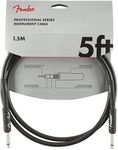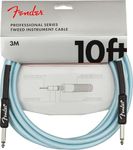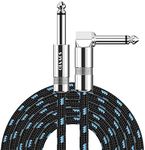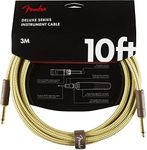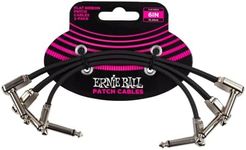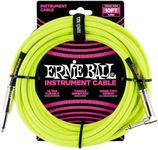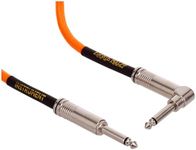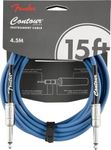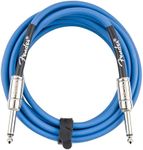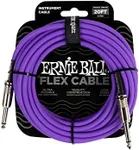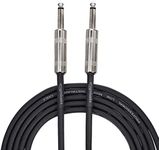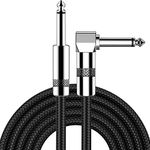Buying Guide for the Best Guitar Cables
Choosing the right guitar cable is crucial for ensuring the best sound quality and performance from your instrument. A good cable can make a significant difference in your overall playing experience, so it's important to understand the key specifications and how they affect your sound. Here are some important factors to consider when selecting a guitar cable.LengthThe length of a guitar cable is important because it can affect the signal quality and convenience. Shorter cables (under 10 feet) are ideal for home practice or studio use where you don't need to move around much. Medium-length cables (10-20 feet) are versatile and suitable for most live performances. Longer cables (over 20 feet) are useful for large stages but can introduce more signal loss and noise. Choose a length that matches your playing environment and mobility needs.
ShieldingShielding refers to the protective layer around the cable that prevents interference and noise from affecting the signal. Good shielding is essential for maintaining a clean sound. There are different types of shielding, such as braided, foil, and spiral. Braided shielding offers the best protection but can be more expensive. Foil shielding is lightweight and effective for short cables. Spiral shielding is flexible and good for medium-length cables. Consider your playing environment and the potential for interference when choosing the type of shielding.
Connector TypeThe connectors on a guitar cable are the plugs that connect to your guitar and amplifier. The most common type is the 1/4-inch TS (tip-sleeve) connector. Some cables have straight connectors, while others have right-angle connectors. Straight connectors are versatile and fit most setups, while right-angle connectors are useful for tight spaces and reducing strain on the cable. Choose the connector type based on your equipment layout and personal preference.
Cable MaterialThe material of the cable affects its durability and flexibility. Common materials include PVC, rubber, and braided fabric. PVC cables are affordable and durable but can be stiff. Rubber cables are more flexible and resistant to tangling. Braided fabric cables offer the best flexibility and durability but can be more expensive. Consider how often you move around and the wear and tear your cable will experience when choosing the material.
CapacitanceCapacitance is a measure of how much signal the cable can store, and it affects the tone of your guitar. Lower capacitance cables preserve the high frequencies better, resulting in a clearer sound. Higher capacitance cables can roll off the high frequencies, giving a warmer tone. If you prefer a bright and clear sound, look for cables with low capacitance. If you like a warmer, vintage tone, higher capacitance cables might be more suitable.
